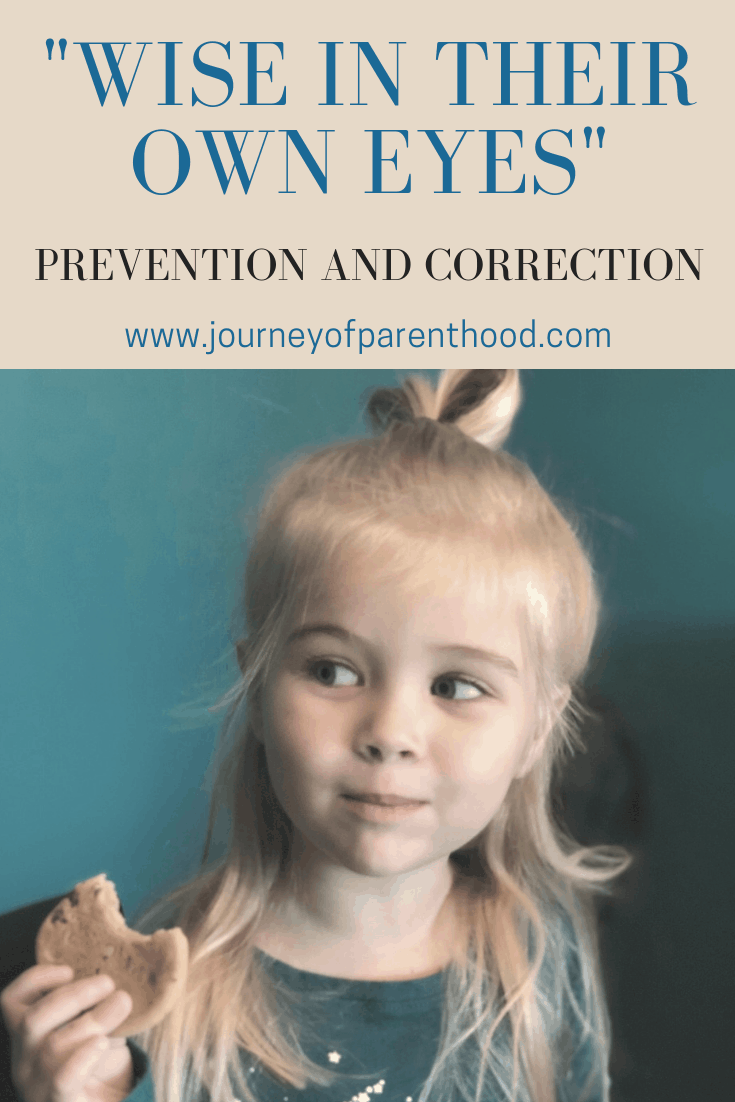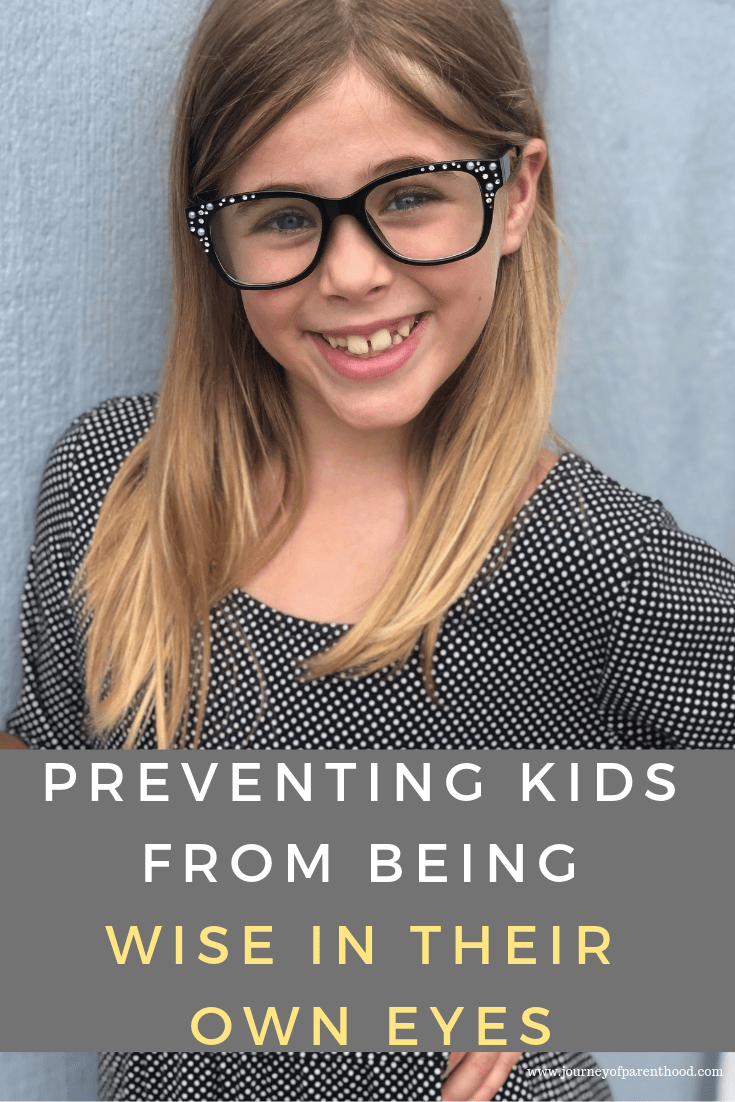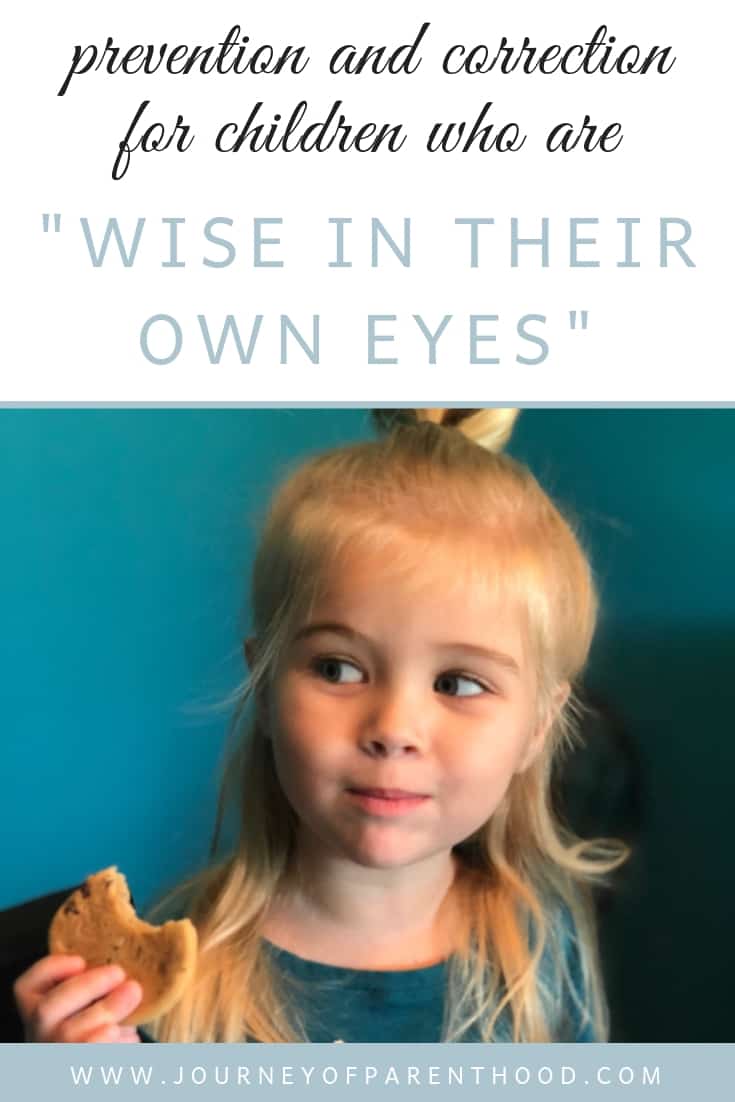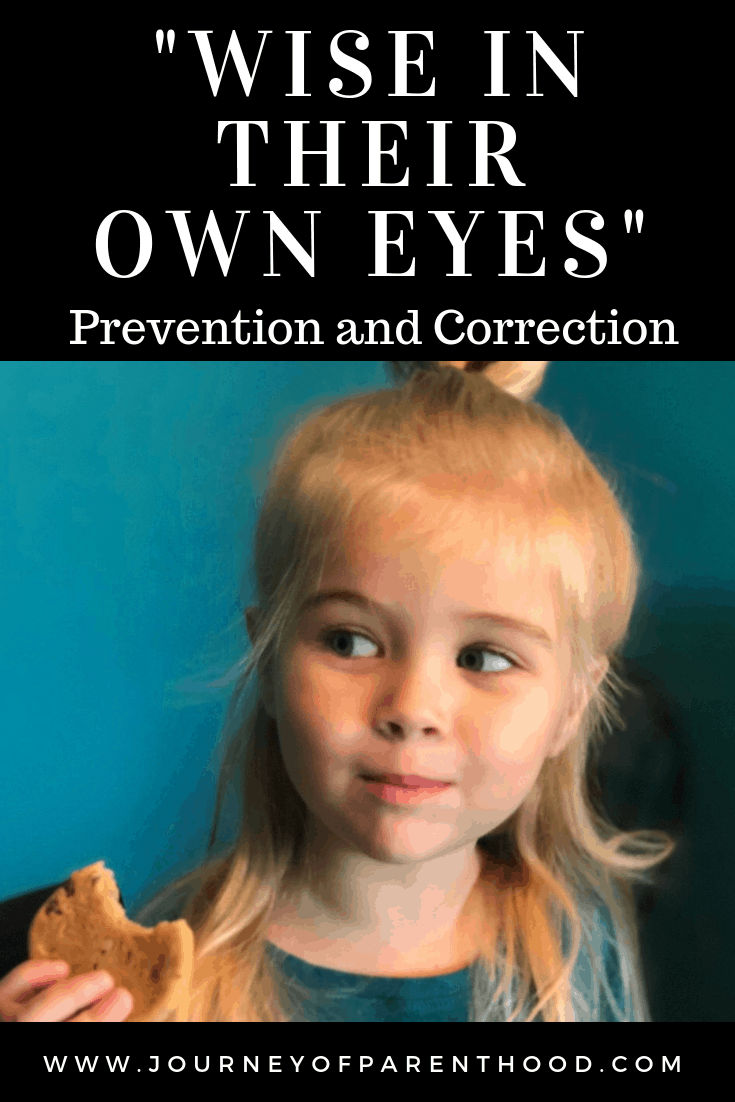Wise in their Own Eyes – Prevention and Correction.
The preschooler age is so fun. These are the years from ages 2-5.
Preschoolers are old enough to truly have their own personalities and interests and to start having the ability to think for themselves and independence in many areas regarding their ability to complete tasks on their own without help.
However, this new found independence often leads to the struggle of the preschooler becoming “wise in their own eyes.”

Wise in Their Own Eyes
As On Becoming Preschool Wise states on page 72: A child who acts wise in his own eyes is a child living above his age appropriate level of freedom.
This is not only a Babywise principal but is also a Biblical principal with a few Bible verses about the topic.
The first is found in Proverbs 26:12 (New International Version): “Do you see a person wise in their own eyes? There is more hope for a fool than for them.”
It is also found in Isaiah 5:21 (New American Standard Bible): “Woe to those who are wise in their own eyes and clever in their own sight.”
Children who are wise in their own eyes will go against instruction and parental guidance and make choices they should not be making.
As a parent when I allow my children to have too many freedoms, make too many choices, or have freedoms beyond their age levels then I am setting them up to become wise in their own eyes. I am setting them up to be a fool.
The freedoms in which parents tend to allow too many of at too early of ages include decision-making freedoms, physical freedoms, and verbal freedoms.
An example of a child who is “wise in their own eyes” would be: We sit-down for a family meal at dinnertime.
My four-year-old, Tess, gets upset when she’s handed a blue fork instead of a pink one.
Her older sister trades forks with her, allowing Tess to use the pink.
She then sees the food on her plate and says she doesn’t want to eat pasta.
She immediately says “I don’t like pasta. I won’t eat this! I want my cookie!”
A back and forth bargaining ensues and the end result is that Tess barely touches the pasta yet is still allowed dessert.
While sitting at the table as a family Tess suddenly decides she’s finished eating and gets up from the table and starts playing with a toy in the living room.
When asked to come back to the table to finish the meal as a family Tess throws down her toy and pitches a fit so both my husband and I just sigh and allow her to continue playing with the toy in the living room rather than have her rejoin the meal while pitching a fit.
In this example Tess is being allowed too many decision making freedoms as in choosing the color of her fork and being allowed to choose not to eat the healthy portion of her meal.
She is also being allowed verbal freedoms in speaking unkindly about the food that was served at dinner and saying what she was going to eat rather than asking.
Finally Tess is also showing too many physical freedoms in her decision to get up from the table and go do something else while the rest of the family is still eating.
Pay attention throughout your day with your child. Are they obedient? Do they speak respectfully? Are they well-mannered and handle instruction with ease and without conflict?
It is easy to see how parents often fall into the trap of allowing children too many freedoms and thus creating the “wise in their own eyes” dilemma.
Prevention of the “Wise in Their Own Eyes” Problem
The key to preventing the “wise in their own eyes” struggle is to keep the parent in the decision making drivers seat and to keep a proper balance of age appropriate freedoms for children.
An important thing to keep in mind is to parent “inside the funnel” (I have a post on this topic here!)
It is easy as a parent to fall into the trap of giving into your child’s wants and needs. It’s FUN to make our children happy.
It feels GOOD to give them things that they desire.
To see their joy as they do the things they want to do in the way in which they want to do them. It’s also EASY to sit back and let the child have their way.
But it is important to keep in mind that we must start as we mean to go on and that the decisions we make as parents today will have long term effects on our children well into their adult lives.
As a mother I want to raise my children to be independent adults who are positive members in society.
They must learn how to be independent and how to communicate with others and work well with others in order for them to be self-sufficient adults.
It would be easy to think that allowing a child many freedoms early on will help them to be more independent when they get older but the exact opposite is actually true.
In preventing the “wise in their own eyes” problem we must be mindful to only allow our children the freedoms to make choices that are age appropriate.
A four year old may be able to handle choosing what shirt they want to wear to school but they are probably not yet fully able to match a shirt and pants along with the appropriate shoes or have the ability to know whether they need to wear short sleeves or long sleeves or have a jacket or need a rain coat.
As a parent it is wise to limit the four year olds’ freedom to a defined area that they are able to truly handle with ease.
Child chooses the shirt, Mommy chooses the rest of the outfit. This is an example of allowing an age appropriate freedom while still staying within the age appropriate funnel.
Allowing too many freedoms forces a child to carry an oversized burden he is not prepared to carry. (On Becoming Preschool Wise page 70).
In allowing them only age appropriate choices and freedoms, we are allowing our children to grow and develop the skills they need to be able to make proper choices on their own in the future.
If the four year old child were allowed to choose their entire outfit they would not learn the proper skills in considering weather or learn how to properly match items together.
By slowly allowing these freedoms over time there is the chance for the parent to train them in these areas so when the child is old enough to handle making these decisions they will be well equip for the task.
When teaching decision making we want to train our children how to make good choices.

Correction of the “Wise in Their Own Eyes” Problem
Allowing a child too many freedoms is a common parenting struggle.
If you have come to realize that your child is “wise in their own eyes” do not beat yourself up over it or feel guilt for falling into this cycle.
You are not alone!
I have four children and with each of them I have fallen into the trap of granting them too many freedoms at too young of an age and have to have a “choice bootcamp” to get back on track.
Just as it is easy to allow a child too many freedoms and choices, it is also easy to reign it back in and take back the leadership role of authority in the family unit.
The first step in this process is to eliminate your child’s abilities to choose.
This means taking away ALL their freedoms and choices.
It is easier to take them all away rather than try to figure out which ones to limit and which are still
By removing the ability of your child to make choices, you are putting yourself back in charge as the decision maker.
You are re-establishing yourself as the leader of the home and redefining the time in which a child is able to handle the responsibility of having choices.
The freedom to choose is something that is earned and is a privilege given to a child when they show they are truly ready to handle the task.
By taking away the privilege it is then able to be seen as such rather than a “right” they have as the “leader of the house.”
This is not an easy task and it will take several days (or even weeks) to see improvement with your child. During this time period the parent makes every choice.
From the larger decisions like what is served at meal times, when a child is allowed to play, and bedtime routine to even smaller decision making like what the child is going to wear, what movie they are allow to watched a video time, what songs are played in the car, etc.
How do you know when to allow back some freedoms?
You will know the child is ready to handle some freedoms being returned to them when they fully accept your decisions without any complaint, any pushback, or any other issues.
Going back to our earlier dinner example: At
She eats her pasta without any complaints. She then sits with us as a family until we tell her she’s able to be dismissed.
When the mealtime goes this smoothly then we know that Tess is able to handle some choices in this situation.
It’s important when giving the child freedoms to always, always keep their age in mind and continue to limit their ability to make choices to only those areas in which are appropriate for their age.
This means that I would still decide what is for dinner.
And my husband and I would still be the ones to decide when it is time to leave the table when the meal is finished.
However, Tess is old enough at four years old to help set the table and therefore can be allowed the freedom to choose which color of fork she eats with during dinner time.
A great, simple way to make sure the parent stays in the leadership role of the family is to require a response from your children whenever instruction is given.
In our home my children say “Yes Ma’am Mommy.”
This not only lets me know that they heard my request but that they also understand it and are responding in obedience.
If a child complains about the meal we’re having I will simply say “Mommy decides what we have for dinner and this is what we are eating.”
The child will then respond with “Yes Ma’am Mommy.” End of discussion. No back and forth or battle of power.
Page 80 of On Becoming Preschool Wise further emphasizes why this response is so valuable: “Do not underestimate the power of this response in retraining your child’s heart.
It actually creates a willingness in your child to follow your lead.”
Understanding your child’s mindset can help in so many ways when it comes to training them up in the way in which they should go. This post from Mama’s Organized Chaos goes into detail on the preschooler’s mindset and correcting their behaviors accordingly.
Conclusion
As a parent I strive to raise my children to be lights in this world.
My goal is for them not to be wise in their own eyes but instead to have age appropriate freedoms so that they can mature at an suitable rate in order to be best equip for the world of adulthood.
Like the King James Version says in Proverbs 22:6: “Train up a child in the way he should go: and when he is old, he will not depart from it.”
- A Letter to my Son on His 16th Birthday From Mom (Kye’s Bday Letter) - March 20, 2025
- Open Letter to my Daughter on her 12th Birthday – Love, Mom {Britt’s 12th Bday Letter} - January 16, 2025
- Letter to My Son on his 6th Birthday – Love Mom - January 8, 2025








